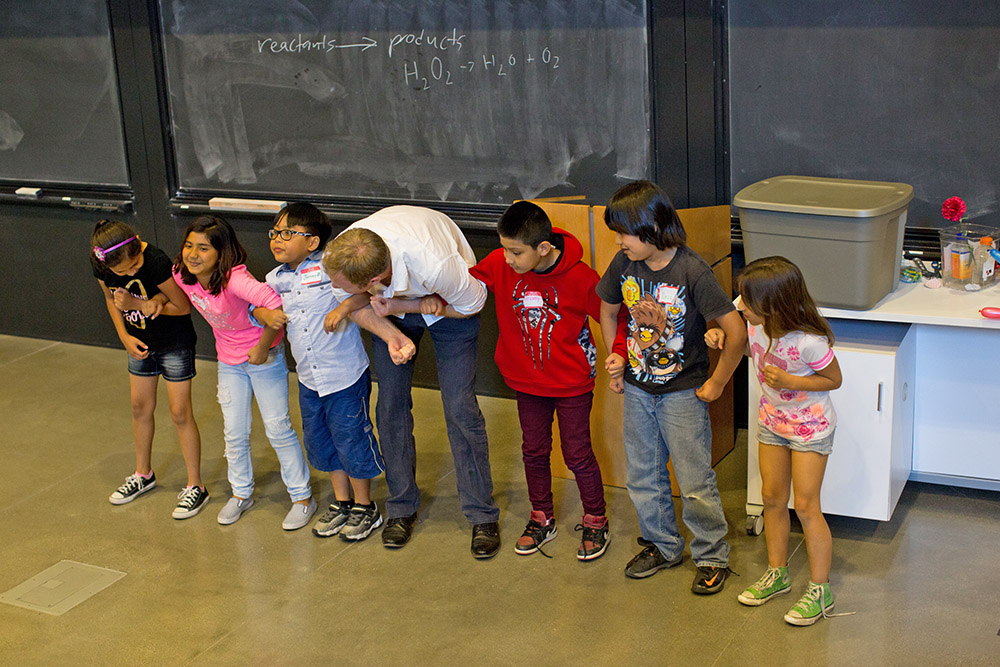Commitment to Community Service Earns Harvey Mudd National Recognition
October 4, 2016
Community engagement is not a buzzword at Harvey Mudd College.
“It’s a critical, necessary and intrinsic component of a world-class institution of higher education,” says Gabriela Gamiz, director of Harvey Mudd’s Office of Community Engagement.
The College’s dedication to community engagement earned it a spot on the 2015 President’s Higher Education Community Service Honor Roll in the Education category, which recognizes institutions that have made a commitment to improving educational outcomes for children and youth in pre-kindergarten through undergraduate education.
This is the first time HMC has earned the award, which recognizes higher education institutions that reflect the values of exemplary community service and achieve meaningful outcomes in their communities.
HMC’s mission statement and Strategic Vision speak to developing top-tier STEM professionals “with a clear understanding of the impact of their work on society,” global engagement and informed contributions to society.
“Community engagement at Harvey Mudd College is about more than just one-time opportunities,” Gamiz says. “We seek sustained involvement that is driven by dialogue, sharing expertise and building capacity.”
The Office of Community Engagement works with faculty to support and develop new service-learning courses, utilizes endowed funds to support student community engagement efforts and offers a number of community involvement opportunities for students. Close to half of the Harvey Mudd student body collectively contribute about 17,000 hours to community service each year.
Three community engagement projects highlighted in Harvey Mudd’s 2015 Honor Roll application are:
- Community tutoring: Harvey Mudd College offers free, over-the-phone tutoring in math and science for students in grades four through 12 nationwide via Homework Hotline; and DOS Tutoring twice weekly in math and science for students in grades six through 12.
- Computer science initiative: The NSF-supported MyCS program is designed to develop computer science fluency among middle- and high-school teachers in the Pomona Unified School District (PUSD) and in Kauai, Hawaii, and to help them create new courses for implementation at their school sites. More than two dozen computer science classes have been developed by program participants, with more than 3,000 students in middle and high school earning elective credit in these courses. HMC students also partner with PUSD elementary school teachers to develop educational games for use on iPads under the NSF-supported Gaming Project. Ten iPad apps that focus on math and environmental science literacy have been developed and made freely available via iTunes for anyone to download and use.
- Science Bus: This student-run, volunteer organization teaches weekly, hands-on science lessons to fourth- and fifth-grade students at local elementary schools, with topics ranging from erosion to electromagnetism. Volunteers teach in 15-20 classrooms at five different schools, reaching more than 600 students weekly. In addition, Science Bus invites its participants and their families to the Harvey Mudd campus for Science Day where they enjoy hands-on explorations of STEM topics and faculty demonstrations of current research projects.
The President’s Higher Education Community Service Honor Roll is part of the Corporation for National and Community Service’s strategic commitment to engage millions of college students in service and to celebrate the critical role of higher education in strengthening communities. Honorees are chosen based on a series of selection factors, including the scope and innovation of service projects, the extent to which service-learning is embedded in the curriculum, the school’s commitment to long-term campus-community partnerships and measurable community outcomes as a result of the service.
